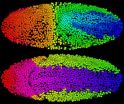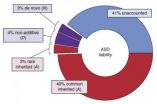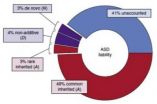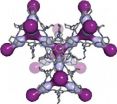(Press-News.org) Scientists reveal the structure of one of the most important and complicated proteins in cell division – a fundamental process in life and the development of cancer – in research published in Nature today (Sunday).
Images of the gigantic protein in unprecedented detail will transform scientists' understanding of exactly how cells copy their chromosomes and divide, and could reveal binding sites for future cancer drugs.
A team from The Institute of Cancer Research, London, and the Medical Research Council Laboratory of Molecular Biology in Cambridge produced the first detailed images of the anaphase-promoting complex (APC/C).
The APC/C performs a wide range of vital tasks associated with mitosis, the process during which a cell copies its chromosomes and pulls them apart into two separate cells. Mitosis is used in cell division by all animals and plants.
Discovering its structure could ultimately lead to new treatments for cancer, which hijacks the normal process of cell division to make thousands of copies of harmful cancer cells.
In the study, which was funded by Cancer Research UK, the researchers reconstituted human APC/C and used a combination of electron microscopy and imaging software to visualise it at a resolution of less than a billionth of a metre.
The resolution was so fine that it allowed the researchers to see the secondary structure – the set of basic building blocks which combine to form every protein. Alpha-helix rods and folded beta-sheet constructions were clearly visible within the 20 subunits of the APC/C, defining the overall architecture of the complex.
Previous studies led by the same research team had shown a globular structure for APC/C in much lower resolution, but the secondary structure had not previously been mapped. The new study could identify binding sites for potential cancer drugs.
Each of the APC/C's subunits bond and mesh with other units at different points in the cell cycle, allowing it to control a range of mitotic processes including the initiation of DNA replication, the segregation of chromosomes along protein 'rails' called spindles, and the ultimate splitting of one cell into two, called cytokinesis. Disrupting each of these processes could selectively kill cancer cells or prevent them from dividing.
Dr David Barford, who led the study as Professor of Molecular Biology at The Institute of Cancer Research, London, before taking up a new position at the Medical Research Council Laboratory of Molecular Biology in Cambridge, said:
"It's very rewarding to finally tie down the detailed structure of this important protein, which is both one of the most important and most complicated found in all of nature. We hope our discovery will open up whole new avenues of research that increase our understanding of the process of mitosis, and ultimately lead to the discovery of new cancer drugs."
Professor Paul Workman, Interim Chief Executive of The Institute of Cancer Research, London, said: "The fantastic insights into molecular structure provided by this study are a vivid illustration of the critical role played by fundamental cell biology in cancer research.
"The new study is a major step forward in our understanding of cell division. When this process goes awry it is a critical difference that separates cancer cells from their healthy counterparts. Understanding exactly how cancer cells divide inappropriately is crucial to the discovery of innovative cancer treatments to improve outcomes for cancer patients."
Dr Kat Arney, Science Information Manager at Cancer Research UK, said "Figuring out how the fundamental molecular 'nuts and bolts' of cells work is vital if we're to make progress understanding what goes wrong in cancer cells and how to tackle them more effectively. Revealing the intricate details of biological shapes is a hugely important step towards identifying targets for future cancer drugs."
INFORMATION:
The Institute of Cancer Research, London, is one of the world's most influential cancer research institutes.
Scientists and clinicians at The Institute of Cancer Research (ICR) are working every day to make a real impact on cancer patients' lives. Through its unique partnership with The Royal Marsden Hospital and 'bench-to-bedside' approach, the ICR is able to create and deliver results in a way that other institutions cannot. Together the two organisations are rated in the top four cancer centres globally.
The ICR has an outstanding record of achievement dating back more than 100 years. It provided the first convincing evidence that DNA damage is the basic cause of cancer, laying the foundation for the now universally accepted idea that cancer is a genetic disease. Today it leads the world at isolating cancer-related genes and discovering new targeted drugs for personalised cancer treatment.
As a college of the University of London, the ICR provides postgraduate higher education of international distinction. It has charitable status and relies on support from partner organisations, charities and the general public.
The ICR's mission is to make the discoveries that defeat cancer. For more information visit www.icr.ac.uk
About Cancer Research UK
Cancer Research UK is the world's leading cancer charity dedicated to saving lives through research.
Cancer Research UK's pioneering work into the prevention, diagnosis and treatment of cancer has helped save millions of lives.
Cancer Research UK receives no government funding for its life-saving research. Every step it makes towards beating cancer relies on every pound donated.
Cancer Research UK has been at the heart of the progress that has already seen survival rates in the UK double in the last forty years.
Today, 2 in 4 people survive cancer. Cancer Research UK's ambition is to accelerate progress so that 3 in 4 people will survive cancer within the next 20 years.
Cancer Research UK supports research into all aspects of cancer through the work of over 4,000 scientists, doctors and nurses.
Together with its partners and supporters, Cancer Research UK's vision is to bring forward the day when all cancers are cured.
For further information about Cancer Research UK's work or to find out how to support the charity, please call 0300 123 1022 or visit www.cancerresearchuk.org. Follow us on Twitter and Facebook.
The Medical Research Council has been at the forefront of scientific discovery to improve human health. Founded in 1913 to tackle tuberculosis, the MRC now invests taxpayers' money in some of the best medical research in the world across every area of health. Twenty-nine MRC-funded researchers have won Nobel prizes in a wide range of disciplines, and MRC scientists have been behind such diverse discoveries as vitamins, the structure of DNA and the link between smoking and cancer, as well as achievements such as pioneering the use of randomised controlled trials, the invention of MRI scanning, and the development of a group of antibodies used in the making of some of the most successful drugs ever developed. Today, MRC-funded scientists tackle some of the greatest health problems facing humanity in the 21st century, from the rising tide of chronic diseases associated with ageing to the threats posed by rapidly mutating micro-organisms. www.mrc.ac.uk
The Institute of Cancer Research, London, is one of the world's most influential cancer research institutes.
Scientists and clinicians at The Institute of Cancer Research (ICR) are working every day to make a real impact on cancer patients' lives. Through its unique partnership with The Royal Marsden Hospital and 'bench-to-bedside' approach, the ICR is able to create and deliver results in a way that other institutions cannot. Together the two organisations are rated in the top four cancer centres globally.
The ICR has an outstanding record of achievement dating back more than 100 years. It provided the first convincing evidence that DNA damage is the basic cause of cancer, laying the foundation for the now universally accepted idea that cancer is a genetic disease. Today it leads the world at isolating cancer-related genes and discovering new targeted drugs for personalised cancer treatment.
As a college of the University of London, the ICR provides postgraduate higher education of international distinction. It has charitable status and relies on support from partner organisations, charities and the general public.
The ICR's mission is to make the discoveries that defeat cancer. For more information visit www.icr.ac.uk
About Cancer Research UK
Cancer Research UK is the world's leading cancer charity dedicated to saving lives through research.
Cancer Research UK's pioneering work into the prevention, diagnosis and treatment of cancer has helped save millions of lives.
Cancer Research UK receives no government funding for its life-saving research. Every step it makes towards beating cancer relies on every pound donated.
Cancer Research UK has been at the heart of the progress that has already seen survival rates in the UK double in the last forty years.
Today, 2 in 4 people survive cancer. Cancer Research UK's ambition is to accelerate progress so that 3 in 4 people will survive cancer within the next 20 years.
Cancer Research UK supports research into all aspects of cancer through the work of over 4,000 scientists, doctors and nurses.
Together with its partners and supporters, Cancer Research UK's vision is to bring forward the day when all cancers are cured.
For further information about Cancer Research UK's work or to find out how to support the charity, please call 0300 123 1022 or visit www.cancerresearchuk.org. Follow us on Twitter and Facebook.
The Medical Research Council has been at the forefront of scientific discovery to improve human health. Founded in 1913 to tackle tuberculosis, the MRC now invests taxpayers' money in some of the best medical research in the world across every area of health. Twenty-nine MRC-funded researchers have won Nobel prizes in a wide range of disciplines, and MRC scientists have been behind such diverse discoveries as vitamins, the structure of DNA and the link between smoking and cancer, as well as achievements such as pioneering the use of randomised controlled trials, the invention of MRI scanning, and the development of a group of antibodies used in the making of some of the most successful drugs ever developed. Today, MRC-funded scientists tackle some of the greatest health problems facing humanity in the 21st century, from the rising tide of chronic diseases associated with ageing to the threats posed by rapidly mutating micro-organisms. www.mrc.ac.uk END
Scientists map one of most important proteins in life -- and cancer
2014-07-20
ELSE PRESS RELEASES FROM THIS DATE:
Marmoset sequence sheds new light on primate biology and evolution
2014-07-20
HOUSTON – (July 20, 2014) – A team of scientists from around the world led by Baylor College of Medicine and Washington University in St. Louis has completed the genome sequence of the common marmoset – the first sequence of a New World Monkey – providing new information about the marmoset's unique rapid reproductive system, physiology and growth, shedding new light on primate biology and evolution.
The team published the work today in the journal Nature Genetics.
"We study primate genomes to get a better understanding of the biology of the species that are most closely ...
Speedy computation enables scientists to reconstruct an animal's development cell by cell
2014-07-20
Recent advances in imaging technology are transforming how scientists see the cellular universe, showing the form and movement of once grainy and blurred structures in stunning detail. But extracting the torrent of information contained in those images often surpasses the limits of existing computational and data analysis techniques, leaving scientists less than satisfied.
Now, researchers at the Howard Hughes Medical Institute's Janelia Research Campus have developed a way around that problem. They have created a new computational method to rapidly track the three-dimensional ...
Common gene variants account for most genetic risk for autism
2014-07-20
Most of the genetic risk for autism comes from versions of genes that are common in the population rather than from rare variants or spontaneous glitches, researchers funded by the National Institutes of Health have found. Heritability also outweighed other risk factors in this largest study of its kind to date.
About 52 percent of the risk for autism was traced to common and rare inherited variation, with spontaneous mutations contributing a modest 2.6 percent of the total risk.
"Genetic variation likely accounts for roughly 60 percent of the liability for autism, ...
Genetic risk for autism stems mostly from common genes
2014-07-20
PITTSBURGH—Using new statistical tools, Carnegie Mellon University's Kathryn Roeder has led an international team of researchers to discover that most of the genetic risk for autism comes from versions of genes that are common in the population rather than from rare variants or spontaneous glitches.
Published in the July 20 issue of the journal "Nature Genetics," the study found that about 52 percent of autism was traced to common genes and rarely inherited variations, with spontaneous mutations contributing a modest 2.6 percent of the total risk. The research team — ...
A noble gas cage
2014-07-20
Richland, Wash. -- When nuclear fuel gets recycled, the process releases radioactive krypton and xenon gases. Naturally occurring uranium in rock contaminates basements with the related gas radon. A new porous material called CC3 effectively traps these gases, and research appearing July 20 in Nature Materials shows how: by breathing enough to let the gases in but not out.
The CC3 material could be helpful in removing unwanted or hazardous radioactive elements from nuclear fuel or air in buildings and also in recycling useful elements from the nuclear fuel cycle. CC3 ...
New method for extracting radioactive elements from air and water
2014-07-20
LIVERPOOL, UK – 20 July 2014: Scientists at the University of Liverpool have successfully tested a material that can extract atoms of rare or dangerous elements such as radon from the air.
Gases such as radon, xenon and krypton all occur naturally in the air but in minute quantities – typically less than one part per million. As a result they are expensive to extract for use in industries such as lighting or medicine and, in the case of radon, the gas can accumulate in buildings. In the US alone, radon accounts for around 21,000 lung cancer deaths a year.
Previous ...
Singapore scientists discover genetic cause of common breast tumours in women
2014-07-20
Singapore, 21 July 2014 – A multi-disciplinary team of scientists from the National Cancer Centre Singapore, Duke-NUS Graduate Medical School Singapore, and Singapore General Hospital have made a seminal breakthrough in understanding the molecular basis of fibroadenoma, one of the most common breast tumours diagnosed in women. The team, led by Professors Teh Bin Tean, Patrick Tan, Tan Puay Hoon and Steve Rozen, used advanced DNA sequencing technologies to identify a critical gene called MED12 that was repeatedly disrupted in nearly 60% of fibroadenoma cases. Their findings ...
New technique maps life's effects on our DNA
2014-07-20
Researchers at the BBSRC-funded Babraham Institute, in collaboration with the Wellcome Trust Sanger Institute Single Cell Genomics Centre, have developed a powerful new single-cell technique to help investigate how the environment affects our development and the traits we inherit from our parents. The technique can be used to map all of the 'epigenetic marks' on the DNA within a single cell. This single-cell approach will boost understanding of embryonic development, could enhance clinical applications like cancer therapy and fertility treatments, and has the potential ...
CU, Old Dominion team finds sea level rise in western tropical Pacific anthropogenic
2014-07-20
A new study led by Old Dominion University and the University of Colorado Boulder indicates sea levels likely will continue to rise in the tropical Pacific Ocean off the coasts of the Philippines and northeastern Australia as humans continue to alter the climate.
The study authors combined past sea level data gathered from both satellite altimeters and traditional tide gauges as part of the study. The goal was to find out how much a naturally occurring climate phenomenon called the Pacific Decadal Oscillation, or PDO, influences sea rise patterns in the Pacific, said ...
Common gene variants account for most of the genetic risk for autism
2014-07-20
Nearly 60 percent of the risk of developing autism is genetic and most of that risk is caused by inherited variant genes that are common in the population and present in individuals without the disorder, according to a study led by researchers at the Icahn School of Medicine at Mount Sinai and published in the July 20 edition of Nature Genetics.
"We show very clearly that inherited common variants comprise the bulk of the risk that sets up susceptibility to autism," says Joseph D. Buxbaum, PhD, the study's lead investigator and Director of the Seaver Autism Center for ...




